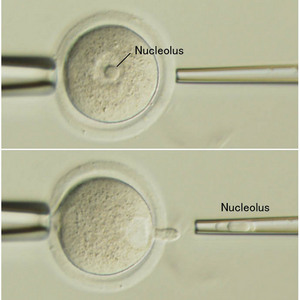Jul. 4, 2008 Research Highlight Biology
Mother’s little helpers
Mammalian fertilized eggs can develop only with a nucleolus inherited from the mother
 Figure 1: Removal of the nucleolus from the oocytes using a very thin pipette. From Ref. 1. Reprinted with permission from AAAS.
Figure 1: Removal of the nucleolus from the oocytes using a very thin pipette. From Ref. 1. Reprinted with permission from AAAS.
An international team led by RIKEN researchers has determined that the nucleolus—the most prominent structure in the nucleus where the cell’s ribosomes, the protein factory organelles, are built—is passed down from the mother, and that it plays an essential role in early embryonic development in mammals.
The work adds to an understanding of the necessary components comprising the zygote, the truly totipotent cell which develops into every other kind of cell in an organism.
It has long been known that the nucleolus is responsible for assembling ribosomes, but that this activity ceases in fully-grown oocytes and fertilized eggs. In fact, until now the role of nucleolus during and after fertilization has been unclear.
In a series of experiments using pig and mouse oocytes from which only the nucleolus was microsurgically removed (Fig. 1), researchers from RIKEN’s Center for Developmental Biology in Kobe in collaboration with colleagues from Kobe University, Italy and the Czech Republic have gained new understanding of its role. Their work is reported in a recent issue of Science 1.
Oocytes lacking a nucleolus matured normally, and were capable of further division and development when activated with or without fertilization. Early development stopped, however, at the two- or four-cell stage, and these embryos never assembled nucleoli. Control oocytes with intact nucleoli, but from which an equivalent amount of nucleoplasm or nuclear fluid had been removed, continued to divide quite normally, and assembled nucleoli. Interestingly, the cells without nucleoli could be induced to develop normally if the nucleolus were replaced, but only with the oocyte (maternal) nucleolus. Cells with nucleoli from other sources all failed to develop.
The nucleolus must now be added to the list of organelles inherited solely from one parent, says Sugako Ogushi from RIKEN, along with mitochondria from the mother and centrioles from the father. “We still don’t know the precise function of the nucleolus and its molecular components, but are now working to answer these questions by determining the proteins and RNAs present. We hope these studies will lead to a better understanding of how a totipotent zygote is constructed,” she says.
References
- 1. Ogushi, S., Palmieri, C., Fulka, H., Saitou, M., Miyano, T. & Fulka Jr, J. The maternal nucleolus is essential for early embryonic development in mammals. Science 319, 613–616 (2008). doi: 10.1126/science.1151276
